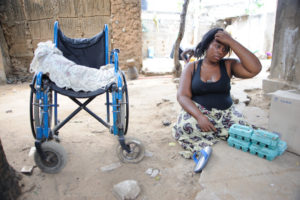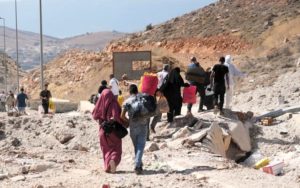
Human rights principles
All of us, as human beings, have a human right to seek asylum elsewhere. This means that if you ever face threats to your life or liberty in the country where you live and feel obliged to escape, then you have a right to leave and find safety in another state.
This principle is enshrined in Article 14 of the Universal Declaration of Human Rights, and is recognised by all countries, including those in Europe and the rest of the developed world, all of whom have also signed the 1951 UN Refugee Convention.
Yet many of those states have introduced a variety of policies and practices that seek to keep refugees away from their territories and so prevent them from exercising their right to seek and enjoy safety there.
Such policies and practices are collectively known as ‘externalization’, and include measures such as visa restrictions, carrier sanctions, interception and return at sea, offshore processing, and deals that incentivise other states to stop the onward movement of refugees.
The outcome of externalisation is ‘containment’. Refugees’ routes to safety in the Global North are blocked and shut down, and so refugees are contained in regions in the Global South, where 80% of the world’s refugees are compelled to stay, and where host states are less or unable to meet refugees’ urgent needs for security and human rights protection.
European initiatives
The countries of Europe have been at the forefront of the externalization process, as demonstrated by two examples of containment.
1) In 2016, the EU signed a deal with Turkey to prevent refugees arriving into Europe and to ensure that they remained in Turkey itself, as well as Middle East countries such as Jordan, Lebanon and Iraq.
As a result, this forces refugees in those countries to effectively face only three options: to live in camps for prolonged periods of time without adequate human rights protection; to eke out a precarious existence in urban areas enduring poverty and further human rights violations; or to risk their lives on ever more dangerous and irregular routes to Europe.
2) In 2017, Italy signed a memorandum of understanding with Libya, which has been bolstered by funding and logistical support from the EU. As part of this arrangement, refugees attempting to reach safety in Europe are regularly intercepted in the Mediterranean by Libya’s militia-linked Coast Guard, or prevented from leaving the country’s shores.
Many refugees who are intercepted in this way are then forced into appalling, overcrowded and disease-ridden detention centres, where they face horrendous abuse, including being starved, beaten, sexually abused and forced into unpaid labour.
As these examples show, externalization results in containment which results in immense physical and mental suffering and human rights deprivations for innocent refugees who are seeking safety.
They also reveal the disingenuous nature of Europe’s refugee and asylum policies. While governments throughout the continent pay lip service to the right to seek and enjoy asylum, they are taking active and increasingly draconian measures to ensure that many refugees will never be able to exercise that right in practice.
Externalisation and containment, in effect, deny refugees escape from harm, prevent them from reaching safety, and so keep refugees in dangerous conditions where they face threats to their lives, liberty and human rights.
Containment and non-refoulement
It is also revealing to compare this practice of containment to refoulement. The cornerstone of International Refugee Law is the principle of ‘non-refoulement’. According to this principle, it is unethical and illegal for states to send anyone who had arrived on their territory back to a country where they would face threats to their life, liberty, or human rights, including, for example, the risk of torture. This principle is accepted by all states who are signatories to the UN Refugee Convention and widely regarded and followed as binding (for the most part) across the globe.
Certain externalisation and containment practices risk violating this fundamental law – for example, by intercepting and returning refugees to Libya, despite the human rights abuses they will face there.
But more than this, containment itself is ethically equivalent to refoulement. Refoulement involves placing refugees in conditions where they face threats to their lives, liberty, and human rights, while containment involves keeping refugees in conditions where they face threats to their lives, liberty and human rights. But is there any moral difference between placing refugees or keeping refugees in conditions where they face such threats?
The answer must be no. Both refoulement and containment are intentional acts that deny safety to refugees, prevent them from escaping harms, and endanger them by ensuring they face severe threats to their lives, liberty and human rights.
So, since refoulement is unethical and rightfully against International Law, the same must apply to containment. Under the letter of the law, refoulement is prohibited but containment is not, but there is no moral difference between the two, and so this apparent ‘loop hole’ has been exploited by states seeking to prevent refugee arrivals, but is ultimately ethically unsustainable. Containment, just as refoulement, prevents escape, denies safety and endangers innocent refugees. And for this reason, it is just as unethical and should be just as prohibited as refoulement.
There is now then an urgent need to uphold the principle of non-refoulement, and to challenge externalization and containment as equally unethical as refoulement, and, more generally, stop the inhumanity at Europe’s borders. In doing so, we can help to ensure that people around the world can, in the words of the Universal Declaration of Human Rights, “seek and enjoy asylum from persecution”, something that we are all, as human beings, morally and legally entitled to.
About the author:
Dr. Bradley Hillier-Smith is a volunteer with United Against Inhumanity, an Associate Lecturer in Moral, Legal and Political Philosophy at St. Andrew’s University, and author of a forthcoming book on the ethics of state responses to refugees. For a more detailed ethical analysis of the parallels between refoulement and containment, please, see his ‘Doing and Allowing Harm to Refugees’ here.
The content is the authors’ responsibility alone and does not necessarily reflect the views of United Against Inhumanity or any of its other members.











